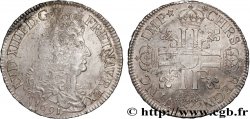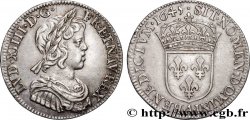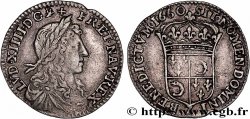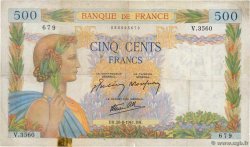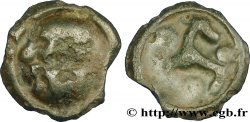E-auction 520-435603 - fme_412221 - LOUIS XIV "THE SUN KING" Médaille Ferréol de Lafage, Capitoul de Toulouse
得先注册又得到批准才可以报价。为了报价注册. 客户应该得到公司允许,那种过程需要 48 个小时。别等出售结束那一天才登记。您报价的话等于您赞成买那物品,而且按« 保价 » 证明您接受 cgb.fr 因特网拍卖使用法.
报价时只可以出全数值欧元总额。物品描述也说明销售结束时间,结束后出价都不会生效。 报价命令转达有时变动,等到最后秒钟增加否决的可能会。想多了解的话请注意 因特网拍卖常问
购货人不付费
购货人不付费
| 估算 : | 500 € |
| 价格 : | 175 € |
| 最高出价 : | 200 € |
| 拍卖结束日期 : | 03 April 2023 19:24:40 |
| 竞拍人 : | 12 竞拍人 |
种类 Médaille Ferréol de Lafage, Capitoul de Toulouse
日期: 1692
铸币厂名称/城市 31 - Toulouse
材质 bronze
直径 62,5 mm
模子方针 12 h.
重量 73 g.
侧面 lisse
印模 sans poinçon
关于品相的说明
Rare médaille particulièrement intéressante avec une patine brune, mais une perforation à midi et de petits défauts sur la tranche
正面
正面的文字 PATRIAE DECORATVS AMORE.
正面的说明书 Buste à droite , perruqué avec habits d’apparat.
背面
背面的文字 MEMORIAE NOBILIS FEREOLI DE LA FAGE BIS CAPITOLINVS / TOLOSA - ANN 1592.
背面的说明书 Écu central aux armes de Toulouse, entouré de 9 écus secondaires (armes de Lafage et des 8 Capitouls de 1692) ; légende autour.
评论
Selon l’ouvrage Histoire des Institutions de la Ville de Toulouse, 1844, par M. le Chevalier Al. Du Mège, “Parmis les magistrats municipaux nés dans Toulouse, et qui administrèrent durant le règne de Louis XIV, on a distingué surtout Ferréol de Lafage, qui fut Capitoul en 1673 et 1683. Son zèle, ses talents l’avaient rendu chers à tous les citoyens ; en 1692, on frappe pour lui une médaille. D’un côté est le buste de ce magistrat ; autour on lit ces mots : Patriae decoratus amore. Sur le revers, on voit les armes de la ville et celles de Lafage et des Capitouls de cette année. La légende est ainsi conçue / Memoriae nobilis Fereoli de Lafage, bis Capitolinus.”
Les capitouls étaient, depuis le Moyen Âge, les habitants élus par les différents quartiers de Toulouse pour constituer le conseil municipal de la ville. Pour devenir Capitoul, il faut être un homme âgé de plus de 25 ans, marié, catholique, posséder une maison à Toulouse et exercer une profession honorable : avocat, procureur, écuyer ou marchand. Toulouse étant une ville ayant le droit de justice et de défense, ainsi que la seigneurie d'un vaste territoire alentour, leurs attributions étaient non seulement administratives, mais judiciaires et militaires. Leurs fonctions étaient reconnues par le roi comme nobles et anoblissantes. L'établissement du parlement de Toulouse au SIVe siècle réduisit leurs prérogatives judiciaires. Avec la Révolution française, le capitoulat est aboli, tout comme les autres institutions locales (dont le parlement et l'université).
On ne peut s'empêcher de faire le rapprochement entre la division de Toulouse en capitoulats, l'élection de capitouls et le choix d'un chef de consistoire, et les arrondissements des grandes villes françaises d'aujourd'hui, l'élection de maires d'arrondissements qui à leur tour élisent le maire.
En 1438, le nombre des capitouls est fixé à huit. Les capitouls sont élus le 25 novembre, un par capitoulat et pour un an.
En 1645, le roi nomme depuis Paris les capitouls malgré les remontrances de la ville qui estime qu'elle peut elle seule élire ses magistrats.
En vertu d'un arrêt du Conseil du 10 novembre 1687, les capitouls sont choisis par le roi sur une liste de quarante-huit candidats présentée par les capitouls sortants et réduite à vingt-quatre par le viguier.
En 1692, le roi impose des capitouls perpétuels mais, en 1700, le système revient à son organisation traditionnelle.
According to the work History of the Institutions of the City of Toulouse, 1844, by M. Knight Al. From Mège, “Among the municipal magistrates born in Toulouse, and who administered during the reign of Louis XIV, we have distinguished above all Ferréol de Lafage, who was Capitoul in 1673 and 1683. His zeal and his talents had made him dear to all citizens; in 1692, a medal was struck for him. On one side is the bust of this magistrate; around we read these words: Patriae decoratus amore. On the reverse, we see the arms of the city and those of Lafage and the Capitouls of this year. The legend is thus conceived / Memoriae nobilis Fereoli de Lafage, bis Capitolinus. \\\"Since the Middle Ages, the capitouls were the inhabitants elected by the different districts of Toulouse to constitute the city's municipal council.. To become a Capitoul, one must be a man over 25 years old, married, Catholic, own a house in Toulouse and exercise an honorable profession: lawyer, prosecutor, squire or merchant. Toulouse being a city with the right of justice and defense, as well as the lordship of a vast surrounding territory, their attributions were not only administrative, but judicial and military. Their functions were recognized by the king as noble and ennobling.. The establishment of the Parliament of Toulouse in the 6th century reduced their judicial prerogatives. With the French Revolution, the capitoulate was abolished, as were other local institutions (including parliament and the university)..
One cannot help but make the connection between the division of Toulouse into capitoulates, the election of capitouls and the choice of a head of consistory, and the districts of the large French cities of today, the election of district mayors who in turn elect the mayor..
In 1438, the number of capitouls was fixed at eight. The capitouls are elected on November 25, one per capitoulate and for one year.
In 1645, the king appointed the capitouls from Paris despite the remonstrances of the city, which considered that it alone could elect its magistrates..
By virtue of a decree of the Council of November 10, 1687, the capitouls are chosen by the king from a list of forty-eight candidates presented by the outgoing capitouls and reduced to twenty-four by the viguier.
In 1692, the king imposed perpetual capitouls but, in 1700, the system returned to its traditional organization.
Les capitouls étaient, depuis le Moyen Âge, les habitants élus par les différents quartiers de Toulouse pour constituer le conseil municipal de la ville. Pour devenir Capitoul, il faut être un homme âgé de plus de 25 ans, marié, catholique, posséder une maison à Toulouse et exercer une profession honorable : avocat, procureur, écuyer ou marchand. Toulouse étant une ville ayant le droit de justice et de défense, ainsi que la seigneurie d'un vaste territoire alentour, leurs attributions étaient non seulement administratives, mais judiciaires et militaires. Leurs fonctions étaient reconnues par le roi comme nobles et anoblissantes. L'établissement du parlement de Toulouse au SIVe siècle réduisit leurs prérogatives judiciaires. Avec la Révolution française, le capitoulat est aboli, tout comme les autres institutions locales (dont le parlement et l'université).
On ne peut s'empêcher de faire le rapprochement entre la division de Toulouse en capitoulats, l'élection de capitouls et le choix d'un chef de consistoire, et les arrondissements des grandes villes françaises d'aujourd'hui, l'élection de maires d'arrondissements qui à leur tour élisent le maire.
En 1438, le nombre des capitouls est fixé à huit. Les capitouls sont élus le 25 novembre, un par capitoulat et pour un an.
En 1645, le roi nomme depuis Paris les capitouls malgré les remontrances de la ville qui estime qu'elle peut elle seule élire ses magistrats.
En vertu d'un arrêt du Conseil du 10 novembre 1687, les capitouls sont choisis par le roi sur une liste de quarante-huit candidats présentée par les capitouls sortants et réduite à vingt-quatre par le viguier.
En 1692, le roi impose des capitouls perpétuels mais, en 1700, le système revient à son organisation traditionnelle.
According to the work History of the Institutions of the City of Toulouse, 1844, by M. Knight Al. From Mège, “Among the municipal magistrates born in Toulouse, and who administered during the reign of Louis XIV, we have distinguished above all Ferréol de Lafage, who was Capitoul in 1673 and 1683. His zeal and his talents had made him dear to all citizens; in 1692, a medal was struck for him. On one side is the bust of this magistrate; around we read these words: Patriae decoratus amore. On the reverse, we see the arms of the city and those of Lafage and the Capitouls of this year. The legend is thus conceived / Memoriae nobilis Fereoli de Lafage, bis Capitolinus. \\\"Since the Middle Ages, the capitouls were the inhabitants elected by the different districts of Toulouse to constitute the city's municipal council.. To become a Capitoul, one must be a man over 25 years old, married, Catholic, own a house in Toulouse and exercise an honorable profession: lawyer, prosecutor, squire or merchant. Toulouse being a city with the right of justice and defense, as well as the lordship of a vast surrounding territory, their attributions were not only administrative, but judicial and military. Their functions were recognized by the king as noble and ennobling.. The establishment of the Parliament of Toulouse in the 6th century reduced their judicial prerogatives. With the French Revolution, the capitoulate was abolished, as were other local institutions (including parliament and the university)..
One cannot help but make the connection between the division of Toulouse into capitoulates, the election of capitouls and the choice of a head of consistory, and the districts of the large French cities of today, the election of district mayors who in turn elect the mayor..
In 1438, the number of capitouls was fixed at eight. The capitouls are elected on November 25, one per capitoulate and for one year.
In 1645, the king appointed the capitouls from Paris despite the remonstrances of the city, which considered that it alone could elect its magistrates..
By virtue of a decree of the Council of November 10, 1687, the capitouls are chosen by the king from a list of forty-eight candidates presented by the outgoing capitouls and reduced to twenty-four by the viguier.
In 1692, the king imposed perpetual capitouls but, in 1700, the system returned to its traditional organization.







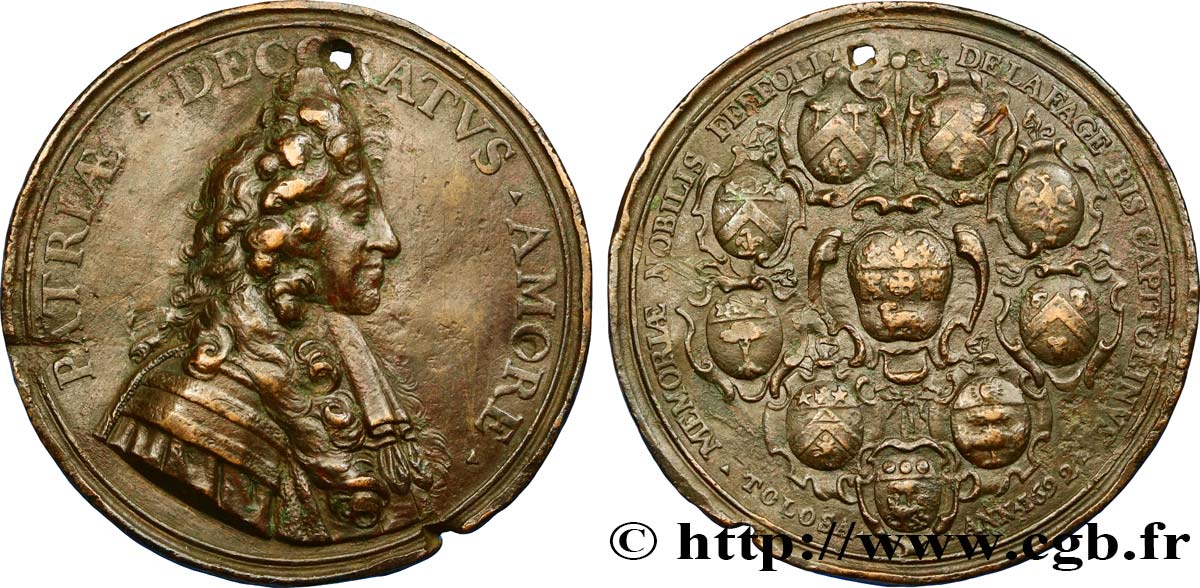
 对产品描述纠错
对产品描述纠错 打印
打印 分享我的选择
分享我的选择 提问
提问 Consign / sell
Consign / sell
 产品介绍
产品介绍